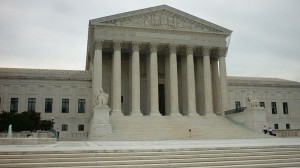 WASHINGTON — Until it decides whether to hear the case in full, the U.S. Supreme Court has temporarily blocked enforcement of a law that some believe will result in the closure of most Texas abortion facilities.
WASHINGTON — Until it decides whether to hear the case in full, the U.S. Supreme Court has temporarily blocked enforcement of a law that some believe will result in the closure of most Texas abortion facilities.
As previously reported, in 2013, following the passage of several safety regulations for abortion facilities, Planned Parenthood and other abortion advocacy groups filed a lawsuit against Texas officials, asserting that the regulations would have an adverse affect on most facilities in the state.
A federal judge appointed by then-President George H.W. Bush soon placed an injunction on portions of the new law, including the requirement that abortionists have admitting privileges at a hospital within 30 miles of the facility, and that facilities be held to the same standards as surgical facilities. District Judge Lee Yeakel declared the regulations an “undue burden” on a woman’s ability to have an abortion.
But as Texas Attorney General Greg Abbott appealed the injunction to the 5th Circuit Court of Appeals, the three-judge panel disagreed with Yeakel that the admitting privileges requirement served no purpose. It stated that although the law would make it more difficult for women to obtain an abortion, the consequence was merely an “incidental effect,” and was “not designed to strike at the right [to abortion] itself.”
The matter was then appealed to the U.S. Supreme Court, which placed a stay on the regulations, holding them until the Fifth Circuit was able to rule on the merits of the law in light of the U.S. Constitution.
The three-judge panel issued its final ruling on June 9, declaring that the regulations withstand constitutional scrutiny because they serve a valid purpose in protecting women’s health and do not burden a “large fraction” of Texas residents. It allowed the law to stand across the state, but made an exception for an abortion facility in McAllen, stating that it would place too much of a burden on abortion-minded women if the location closed.
“[T]he State truly intends that women only receive an abortion in facilities that can provide the highest quality of care and safety—the stated legitimate purpose of H.B. 2,” the court wrote. “Plaintiffs bore the burden of proving that H.B. 2 was enacted with an improper purpose. … They failed to proffer competent evidence contradicting the legislature’s statement of a legitimate purpose for H.B. 2.”
Earlier this month, abortion advocates appealed the ruling back to the U.S. Supreme Court, which on Monday decided to once again place a stay on the regulations until it decides whether or not to take the case.
The same justices who dissented in the court’s recent “gay marriage” decision also dissented in placing a stay on the rules: Chief Justice John Roberts, as well as Justices Samuel Alito, Antonin Scalia and Clarence Thomas all said that they would have allowed the law to move forward.
The regulations were set to officially take effect tomorrow—July 1. The Supreme Court is also considering an appeal from officials in Mississippi over the state’s admitting privileges requirement, which would likely close the last remaining abortion facility in the state.
Become a Christian News Network Supporter...


